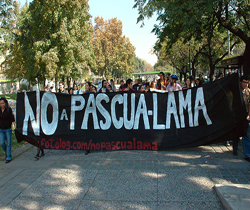05 de Agosto de 2012
 Standard and Poor’s subsequently downgraded Barrick, citing “execution risks surrounding Pascua Lama” and issued a “negative perspective” for the company. Barrick insists that its difficulties stem from inflation and low productivity, but this explanation fails to persuade. Recent developments have angered shareholders, have caused internal shifts, including the dismissal of CEO Aaron Regent, and have strengthened the position of local communities, who have insisted in the project’s infeasibility for more than ten years.
Standard and Poor’s subsequently downgraded Barrick, citing “execution risks surrounding Pascua Lama” and issued a “negative perspective” for the company. Barrick insists that its difficulties stem from inflation and low productivity, but this explanation fails to persuade. Recent developments have angered shareholders, have caused internal shifts, including the dismissal of CEO Aaron Regent, and have strengthened the position of local communities, who have insisted in the project’s infeasibility for more than ten years. 


Minería transfronteriza / Ocultamiento y manipulación de información / Minería a gran escala / Pascua-Lama /
Canadá - Minería transfronteriza
Barrick eleva de nuevo los costos de su megaproyecto Pascua Lama (01/11/2012)
Minería transfronteriza
Firmas y sellos falsos figuran en la aprobación de licencia ambiental de mina Cerro Blanco, señala ministra. Guatemala (24/04/2024)
SEA Atacama realiza visita técnica por EIA “Modificación Fase de Cierre Pascua Lama”. Chile (23/02/2024)
La explotación de una mina de oro en la frontera entre Haití y la República Dominicana causa preocupación. Haití (17/09/2023)
Protesta en las aguas de Güija contra la minería en El Salvador y Guatemala. El Salvador (23/04/2023)
Demanda colectiva contra Barrick Gold por dar falsas declaraciones medioambientales. Chile (14/01/2023)
Guatemaltecos rechazan la mina Cerro Blanco a cielo abierto, que afecta ríos de El Salvador. Guatemala (19/09/2022)
Pascua Lama: Corte Suprema rechaza recurso de casación y confirma fallo de Tribunal Ambiental que sancionó a proyecto minero en proceso de cierre. Chile (14/07/2022)
Ambientalistas de Guatemala y El Salvador rechazan la minería. Guatemala (23/04/2022)
Evalúan avances en actividades de cierre de Pascua Lama. Chile (25/03/2022)
Comunidad logra fallo histórico de la Corte Suprema: Demuestran que Barrick Gold desobedece cierre de Pascua Lama y se ordena a las autoridades supervisarla de manera efectiva. Chile (08/02/2022)
Ver más:
Minería transfronteriza / Ocultamiento y manipulación de información / Minería a gran escala / Pascua-Lama /